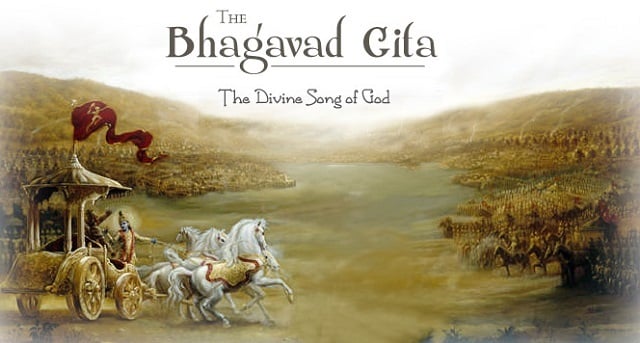“When doubts haunt me, when disappointments stare me in the face, and I see not one ray of hope on the horizon, I turn to Bhagavad-Gita and find a verse to comfort me; and I immediately begin to smile in the midst of overwhelming sorrow. My life has been full of external tragedies and if they have not left any visible or invisible effect on me, I owe it to the teaching of the Bhagavad Gita.” – Mahatma Gandhi
The Bhagavad Gita is a major spiritual script in Hinduism. It is a 700 verse poem, about 5000 years old and is unusual, because it is set in the midst of a great war. In the Bhagavad Gita, The Supreme God in His avatar as the Lord Krishna counsels the Pandava prince and great warrior Arjuna, on the various facets of life and work, honor and duty, and philosophies of human existence.
A brief history of The Bhagavad Gita:
The Bhagavad Gita is a part of the great epic Mahabharata. In an ambitious struggle for the throne of Hastinapura, the evil prince Duryodhana makes a series of assassination attempts and various injustices on his cousins, the righteous Pandava princes. War between the cousins Pandavas and Kauravas (Duryodhana and his brothers) becomes inevitable after many incidents of cheating and treachery. After many unsuccessful attempts by the seniors and even Lord Krishna himself, to avert the war and bring peace, the Pandavas and the Kauravas with their respective ensemble armies and allies gather at the battlefields of Kurukshetra, where the great Kurukshetra war is fought.
Before the start of the war on the first day, Arjuna, the Pandava prince, mighty warrior and greatest archer, upon seeing his relatives – uncles, grand sires, cousins, teachers and friends – gathered for battle, falls to his knees and explains his dilemma to Lord Krishna, who does not take active part in the battle and acts as Arjuna’s charioteer and advisor to the Pandavas. Arujna says he cannot take up arms against his own blood and kill his kin for a mere kingdom. He asks where the honor is in killing one’s own family for a throne. Arjuna gets torn as his very beliefs and ideas of honor and duty are challenged in this peculiar situation.
At this point, Lord Krishna reveals his divine identity, and counsels Arjuna on duty, honor and other aspects of human life. This conversation between Arjuna and Lord Krishna – of the former’s dilemmas and latter’s teachings – form The Bhagavad Gita.
The teachings in The Bhagavad Gita are eternal and hold true even today. It is essential for every human being to understand the knowledge given and try to apply them in their lives to have peace, contentment and fulfillment of desire. If learned, understood and practiced properly, The Bhagavad Gita’s teachings can open many doors of the human mind; doors whose very existence many don’t even realize.
In this weekly series called Song of the Gods – Learnings from the Bhagavad Gita, we will bring you the eternal knowledge and learning from the epic, to help you realize the purpose of your existence, thrive towards a life based on actions and not desires, and bring you closer to realization of the ultimate truths of our existence. In this journey, you will realize the importance of The Bhagavad Gita’s teachings in the modern way of life.
We will bring you the teachings of The Bhagavad Gita, and try to explain the meaning and its relation to our lives even today. Whether you are corporate executive or a house-wife, a social servant or an entrepreneur, a student or a professional, a sinner or a saint, embarking on journey of finding higher truths and purpose will surely change your life.
So stay tuned and get ready to dance to the Song of the Gods!
Please Note: This is not a series of religious teachings or nor is it limited to the mundane definition of “The” Creator. This is a philosophical journey of the most complicated machines ever created – The Human Mind.
Image Credit: http://bit.ly/KQOEe4


